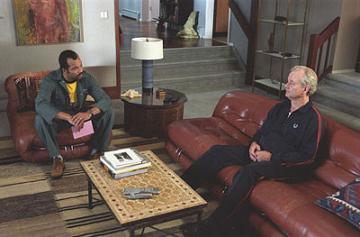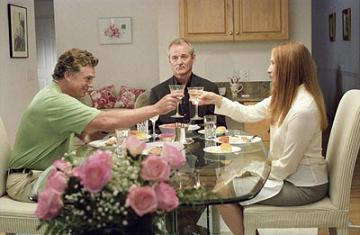

In the past few years, Bill Murray's career has taken a turn. He has tempered his penchant for biting sarcasm, turning into more of a sense of tired resignation. He is quieter, more thoughtful, and a bit sadder. While he was a comedian, he proved in smaller roles that he could act. Lost in Translation was the high point. Now, he takes the character he refined with writer/director Wes Anderson and moves over to another auteur, Jim Jarmusch (Coffee and Cigarettes, Ghost Dog: The Way of the Samurai). Jarmusch is a highly original writer/director that favors a slower, more restrained tempo. The combination of Murray (The Life Aquatic with Steve Zissou, Garfield) seems like a match made in heaven, but the combination does not work as well as one thinks.
This is mainly because Broken Flowers is missing an emotional core. The acting, writing, and directing are a bit too emotionally detached, without some sort of anchor. Lost in Translation had a sense of kinship amongst lost souls anchoring it. Here, it's just lonely single guy Don Johnston (Murray). Murray gives the same good performance he excels at. He can convey more emotion with a tired sigh, crooked look, or quick comment than many other actors. The people around him are a bit quirky/strange, but not strange enough to make Johnston stand out. In this case, Jarmusch's penchant for minimalism works against Broken Flowers a bit, because it feels a bit too empty. Yes, this feeling should mirror Johnston's feelings, but there is too little to grasp onto in order to empathize with his character.
Johnston lives alone. His most recent girlfriend (Julie Delpy, Before Sunset, Waking Life) just left him. He made a lot of money off "computers" a few years ago. His best friend is Winston (Jeffrey Wright, The Manchurian Candidate, D-Tox) is his main link to the world. Winston lives next door with a huge family and likes to think he is an amateur sleuth. The contrast between Winston's bustling, happy family life and Johnston's exile-like bachelorhood bothers Johnston more than he realizes. One day he receives an unsigned letter written with red ink on pink stationary. It states that he has a nineteen-year-old son from a fling two decades ago. Winston coaxes a list of ex-girlfriends from Johnston and uses his skills to track down Johnston's exes and even creates a trip complete with itinerary. Johnston will visit each woman, gently pry for information about her potential children, and look for a telltale typewriter. He pretends to not want any part of this, but there is a part of him that longs for some sort of connection to another person.
Jarmusch assembled an interesting mix of women to play Johnston's exes. Sharon Stone (Catwoman, Cold Creek Manor), Frances Conroy (The Aviator, Catwoman), Jessica Lange (Big Fish, Masked and Anonymous), and Tilda Swinton (Constantine, The Statement) all have their turn in the spotlight. The intervening years have been very different to each woman. Laura (Stone) is a widow who lives with an appropriately named daughter, Lolita (Alexis Dziena, Wonderland, Rhinoceros Eyes). Dora (Conroy) sells real estate with her husband. Carmen (Lange) talks to animals, and Penny (Swinton) lives away from civilization and is still extremely bitter about their relationship. None of them live in an ideal situation, but each one seems to have some sort of love and companionship, something missing from Johnston's life. As the search continues, Johnston begins to want to find his son. Jarmusch and Murray elegantly portray the gradual shift in Johnston's emotions. It is a good portrayal in character growth, but without something else to temper Murray's performance (like the exaggerated oddness of Anderson's films), Broken Flowers loses much of the poignancy that would make it a better movie.